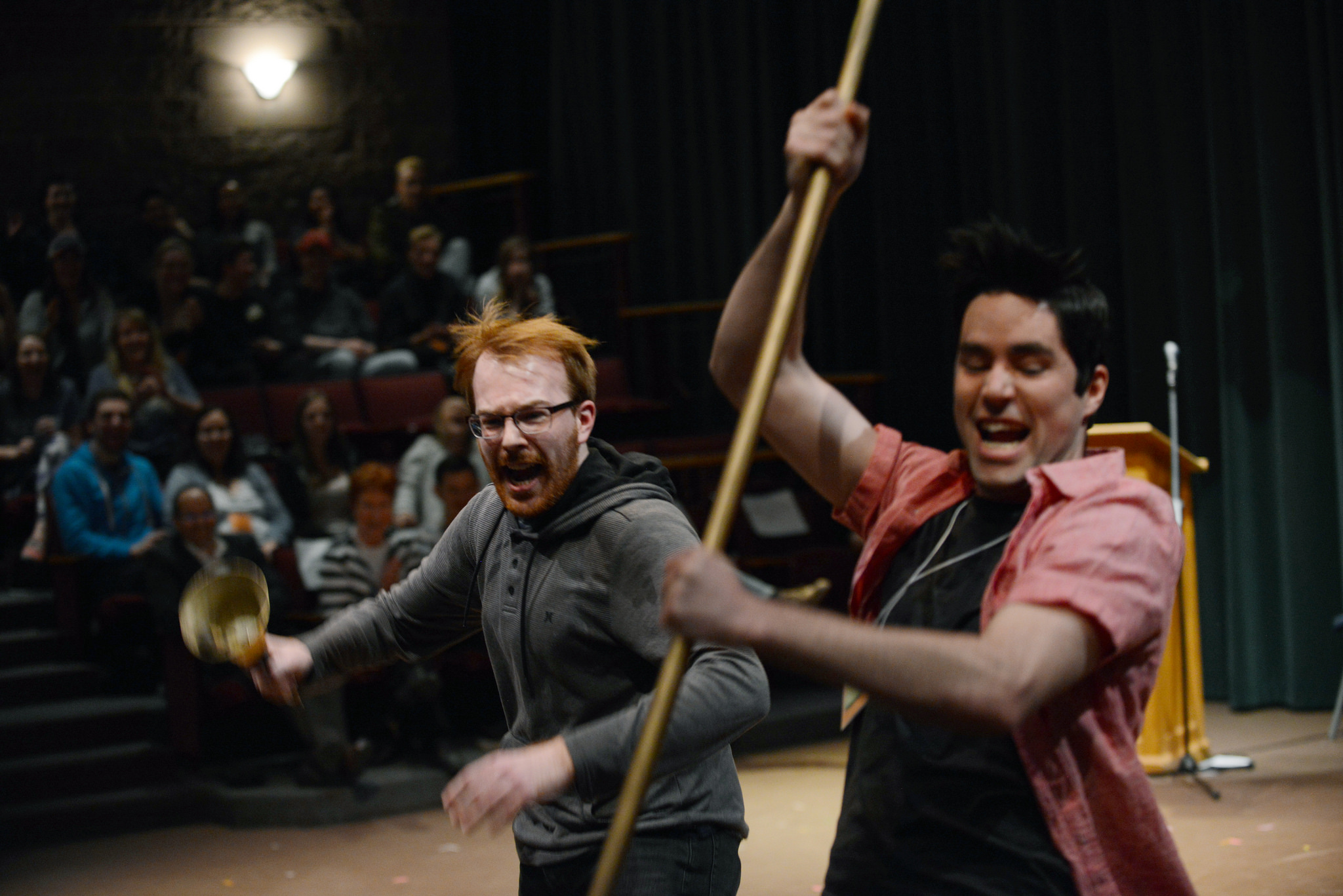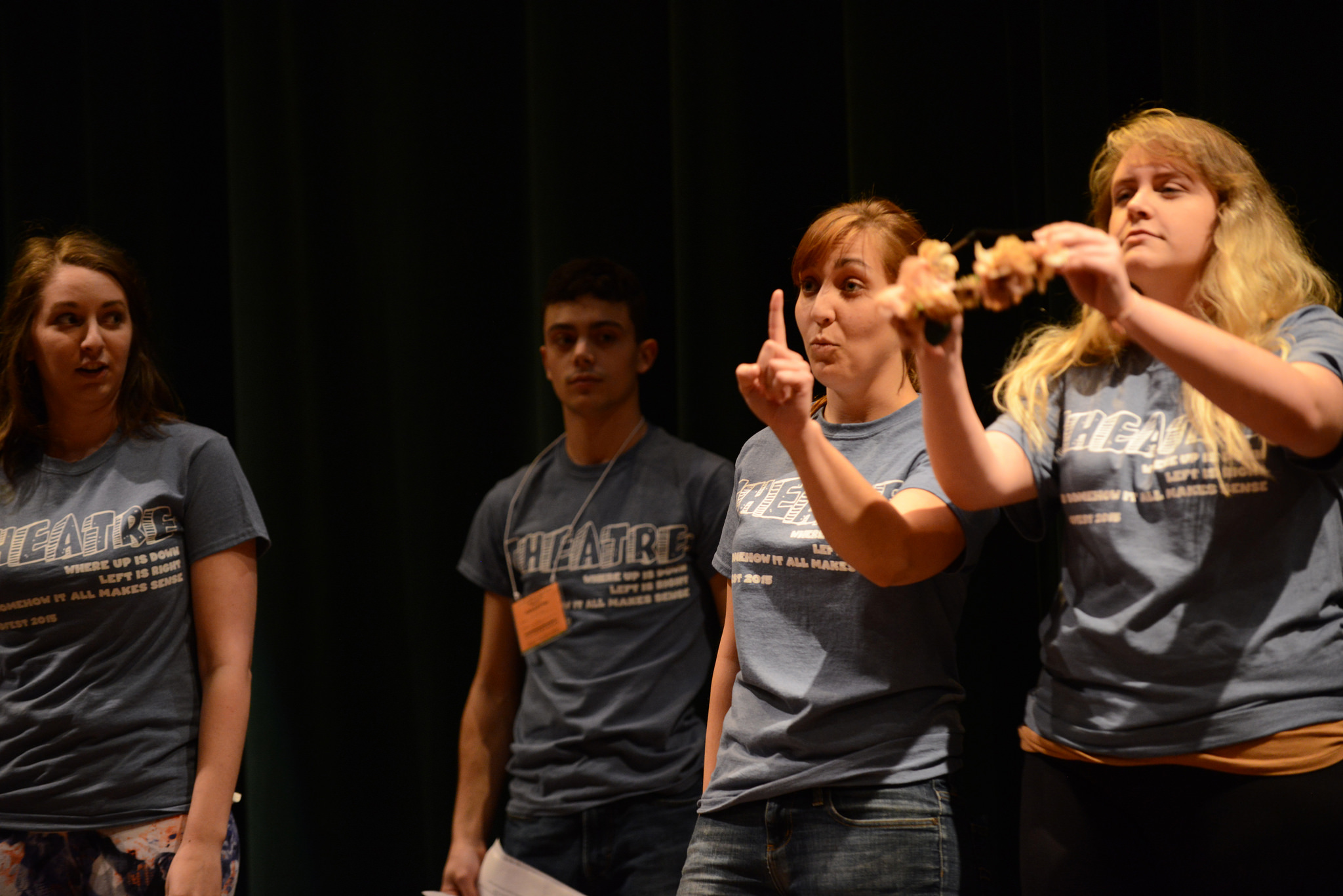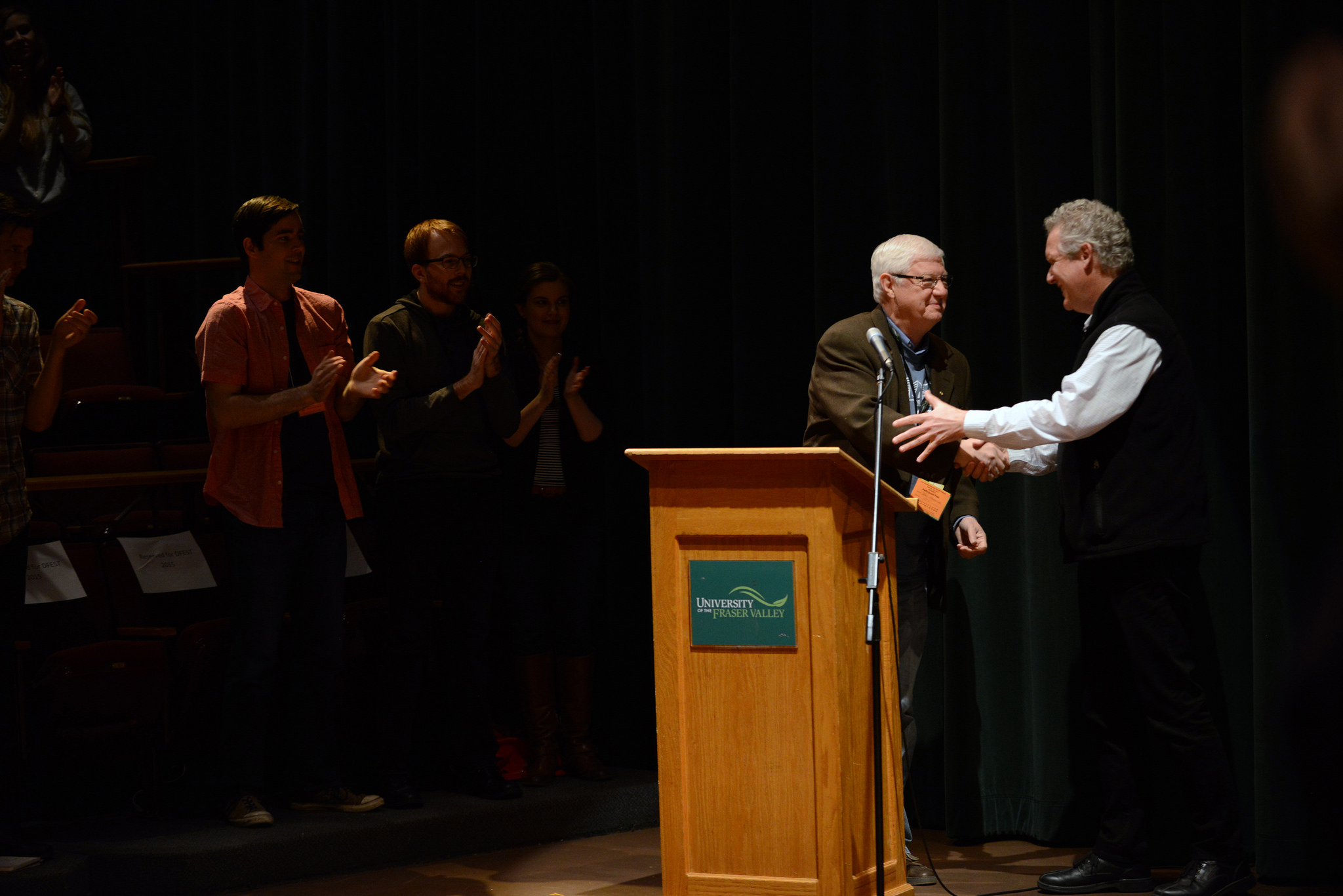By Michael Scoular (The Cascade) – Email
Print Edition: May 6, 2015

If you think of UFV’s theatre department, the first thing that comes to mind is probably the three mainstage shows that run each year: one Shakespeare, the two others some combination of contemporary, Canadian, or a classic play, usually fitting a particular season. But at the end of each academic year, Directors’ Festival (D-Fest) arrives. Surrounded by exam period, it’s not the easiest schedule workaround for students, but where a particular title (the most recent examples being the WWI-set Birdsong, A Christmas Carol, and Julius Caesar) might divide a potential audience, D-Fest provides four and a half days of one-act plays.
Like any festival, the high number of unfamiliar titles means anyone attending enters several of the shows blind besides a brief plot synopsis, but D-Fest has earned a solid reputation over its 20-year history. It’s the only festival of its kind in BC, bringing in visiting shows from Capilano University, Thompson Rivers University, Trinity Western University, and UBC-Okanagan. On the UFV side of things, curator Ian Fenwick, who teaches the directing classes that lead up to the festival, watches the progress of each show, making sure they’re all ready to go before a paying audience. As directing classes run every second year, the 2015 edition of D-Fest was a year for experienced directors to select shows that tested and exceeded what they’d done the previous year — the majority of UFV shows occupied hour-long blocks, with some only one-act in name.
Before I go any further, I should disclose that I have taken theatre courses, and was involved in the devising and staging of one D-Fest show. The role of the critic or journalist is often associated with complete distance, but, without exception, the theatre department does not allow for that. Partly by virtue of its size, and partly due to the spirit of the festival, anyone going to a show will likely find themselves included in conversations with actors, if not other directors, as they wait in line to see the work of their classmates — you’re either friends with some of them by the end of the festival, or you’re actively avoiding everything the festival was founded on: creative conversation.
Fenwick was the star of the opening ceremonies: after starting the theatre department in 1980 and D-Fest a decade after that, he’s retiring, or, as Chilliwack city councillor Jason Lum, a former student of Fenwick’s, said, “attempting to retire.” After welcoming students from other universities and hearing from a number of speakers, all with tributes to Fenwick, the ceremony’s main attraction began: 60 seconds for the actors and director from each play to prove something distinctive about their show. Darcy Knopp’s Tier Two Heroes, represented through a strength-test recitation of the play’s showtimes, an idea that wouldn’t be out of place in a Michel Gondry music video, was awarded as the best of the skits, while Kadeem Willis’ freestyle rendition of a showtune from Cut!, Dylan Coulter’s reading of Samuel Beckett’s Breath, and Eli Funk’s leading of an impromptu all-male dance party to ABBA’s “Dancing Queen” (the song is a centrepiece in Paul Dunn’s Boys) were a few of the other standouts.

Boys was also the first show I saw after the opening ceremonies. Staged at D-Fest 2011 with three actors in three main roles, Funk, with the direction of Dylan Schroeder, performed it as a one-man show, slipping between an ABBA-obsessed tambourine busker, a repressed nightclub corner dancer, an overly enthusiastic sandwich artist who decides to join the army, a therapist, a mother, an army poseur, and a police officer over the course of an hour. Funk’s previous leading role in a mainstage production was Romeo in 2014, and there he resembled not the serio-poetic doom of DiCaprio, but an amorous exuberance, turning the hiding of the balcony scene, for example, into a game. In Boys he stretches this idea, making each role, even the sociopath with “Take a Chance” reverberating in his skull, into a sympathetic, individual character. Dunn’s script explicitly parallels the codes of masculinity embodied in costumes, jobs, and names, and Funk, altering his voice from falsetto to drill sergeant baritone, elevates the material, finding humour in contradiction.
Next on my schedule was another show billed as an extended monologue — Peter Fechter: 59 Minutes, directed by Gabriel Kirkley. Jordan Tannahill’s script, historically sourced from Berlin Wall-era Germany, gives the spotlight to a single actor, but Kirkley reworks it, expanding the cast to four and turning a significant portion of the play into something approaching a two-hander. Working as bricklayers, restless for America, Dylan Coulter (in the main role) and Josh Tompke (as a friend with ideas of escaping East Berlin) sprint across the city, developing plans on the fly, an address close to the Wall in their hands. Tannahill’s script affects the air of casual conversation, even as it is framed by Fechter’s narration, and Coulter and Tompke evoke the kind of relationship common to just-post-adolescence, where an older friend can, despite his carelessness, seem to point toward a world of intellectual superiority and sexual maturity. This play, it was said repeatedly during the festival, was moving, in the tears-freely-flowing kind of way. The ambitious climactic monologue, where Peter’s body’s closeness with the earth and death reaches an imaginative omniscience, in the wrong hands could have come across like the mawkish epiphanies of Stephen Daldry dramas. But Coulter lands it. Phay Gagnon, as Peter’s father, and Ally Schuurman, playing both his mother and the owner of an apartment within leaping distance of the wall, arguably have more difficult roles, suggesting histories of emotion without much in the way of dialogue.
Gagnon could also be seen in the 10-minute monologue I Am Not Batman, written by Marco Ramirez and co-directed by Gagnon and Eli Moores, where innocence and vulgarity, violence and dreams of empathy collide in the mind and actions of a young child. Gagnon, with a minimal set, a hoodie flexible enough to serve as a cowl, Reilly Ellis on drums, and deep red expressionist lighting, gave one of the most memorable performances of the festival — more than can be said of, say, The Dark Knight Rises.
There are two main performance spaces at the Chilliwack North campus, and the studio, the smaller of the two, held just as many excellent works as the main stage, its limitations lending itself to a different level of audience engagement. A Trois, directed by Rae MacEachern from a script by Barry Hall, incorporated the viewpoints acting technique, which has been brought into the theatre department’s teaching by Raina von Waldenburg. Stripped of set artifice and what most audiences would call “actorly” gestures, Ashley Gonzales-Rivas, Nathan Unger, and Darcy Knopp confidently navigated the habitual phrasings and gestures of love, pivoting between affection and malice, routine and spontaneity — most of it done while locking audience members in eye contact.
Last Directors’ Festival, Geneva Perkins directed Mrs. Cage, a dialogue-heavy interrogation one-act made claustrophobic by the studio setting. This year, she used the same space for Third Person, a play by Brandon Wicke, a sort of Cabin in the Woods minus the horror, and with a lot of existentialism. Russell Blower and Rae MacEachern play two campers confronted by a Narrator who appears as type on a screen, changing the drama from a relationship scenario to a Choose Your Own Adventure where the book argues that all choices are futile. Third Person is not an easy play — its vision of the world, following much philosophical circularity and unbending premises, is one where humans are limited and insignificant — but it follows through on its intentions, however unpopular those might be. After the show, Perkins revealed some of its complexities: after the original projection screen ended up absorbing light instead of reflecting it, technical manager Parjad Sharifi and student Calvin Baker created a new one overnight, allowing the show and its hundreds of technical cues (handled by projections operator Nicole Janisch) to seamlessly unfold.
Much lighter technically, but just as demanding in its frequent tonal shifts, was Cheyenne Douglas-Ruttan’s staging of A Quiet Place, by Brendan Gall, where the studio stood in for a doorless prison, with Danny Campbell and Dylan Schroeder its only inhabitants. Abstract enough to stand in for nearly anything, but specific enough in its depiction of emotional drought and human dependency to make its generically named characters stand for something, A Quiet Place is, like all the best plays at D-Fest, a play with the sense that anything could happen, where the ending is unexpected, where musical numbers appear, even if the only music is an actor’s voice.
One of the great things about theatre is that, at any time, everything could go wrong. But actors, rehearsed but also reacting in the moment, can sometimes turn these into some of the most memorable parts of a play. In Cut!, directed by retired UFV production manager Sandy Tait, a purgatorial cucumber flying into the feet of the audience turned an already absurd development (a Hamlet-hating usurper absconds with a Broadway-musical supporting-star’s role, and said would-be matinée idol is then seduced by a Greek-tragic castoff before he is beaten by a Wildean one-line nobody) into a literal showstopper. In Almost Again, directed by Aaron Froc, a sensitive relationship drama whose couple (Russell Blower and Emily MacKinnon), perfectionists prone to mistakes, keep attempting to replay a date night until they get it right, a delayed sound cue was not only saved by Blower’s quick improvisation, but fit with the play’s set-up.

Because it was an off-year for directing classes, D-Fest was also open to student written-plays, including Drivers Anonymous by Shawna Lawson and Such a Heart as Yours by Cait Archer.
Drivers Anonymous is simply structured: five characters meet in an unconventional driving school, get monologues to explain their backstory, each have mishaps on the road, then come together for a finale. This is not a drawback: each character at first appears to be a broad caricature, but through the chemistry of the ensemble cast (Jessi Fowlis, Beth Gasser, Courtney Kelley, Nathan Unger, Dalton Yanciw), and the script, where jokes recur but develop, mixing and matching the incongruities of each character, Lawson has created something that belongs in the driving-school narrative pantheon (next to, say, Mike Leigh’s Happy-Go-Lucky and Justin Lin’s The Fast and the Furious: Tokyo Drift).
Such a Heart as Yours, a palimpsest over Shakespeare’s A Midsummer Night’s Dream, is clearly the work of a talented voice in theatre: Archer’s writing is equally at ease sharing the particulars of undergraduate conversations (research projects, party stories of drinking and bad sex, Taylor Swift) and weaving in the universal currents, rather than the names and lines contained in Shakespearian comedy (desires turning on a dime, the inexplicable forces that language cannot pin down, though it tries). From its opening rhyming cell phone admonishment and festival sponsor message to its cringing-and-laughing relationship entanglements, Archer’s play had a hold on the audience, and its actors (Beth Caldwell, Noel Funk, Dylan Schroeder, Julia Toews, Dalton Yanciw), ably swinging from sudden exits and entrances to laid-back banter, pulled off the difficult act of suggesting both years of history and hardly any time at all. While Such a Heart as Yours was not selected as one of the two plays from UFV (Peter Fechter and Zoo Story) headed to the Harrison Festival for the Arts, one of the numerous stepping stones toward broader exposure theatrical productions need to navigate, it is a play that deserves far more than the three performances it had at D-Fest.
At the closing meeting of the festival, before sets were dismantled and costumes sent to the shop, Fenwick led the directors, who spoke of their intentions, their initial sparks, and the lessons they learned and wanted to pass on to the next year’s classes. Two themes repeated: the only play worth doing is the one that speaks to something in you, personally, even and especially if it seems beyond your abilities, and that the way you exceed your own abilities is by bringing in and relying on great collaborators — writers like myself tend to summarize plays as the work of a name or two, but it is never that way in reality. In turn, each also thanked Fenwick, whose work has influenced countless people, and whose commitment to the festival has made it a unique part of culture in the Fraser Valley. Some wonder how it will go on without his leadership — Fenwick reminded students, alumni, and staff of the work they themselves have done, and how they are capable of continuing it. It will not be the same — in department head Bruce Kirkley’s announcement of the next season of theatre at UFV the changes could already be felt (Twelfth Night, a yet-to-be-confirmed season opener, and a limited run of a student-devised adaptation — the lowest number of performances in many years at UFV). But, as many speakers said, theatre is not, despite how attractive the idea is, magic — it is thousands of hours of work, designed to create the sense of effortlessness. Continuing Fenwick’s work at UFV will take a great deal more of that, but if this year’s Directors’ Festival was any indication, it is possible.

